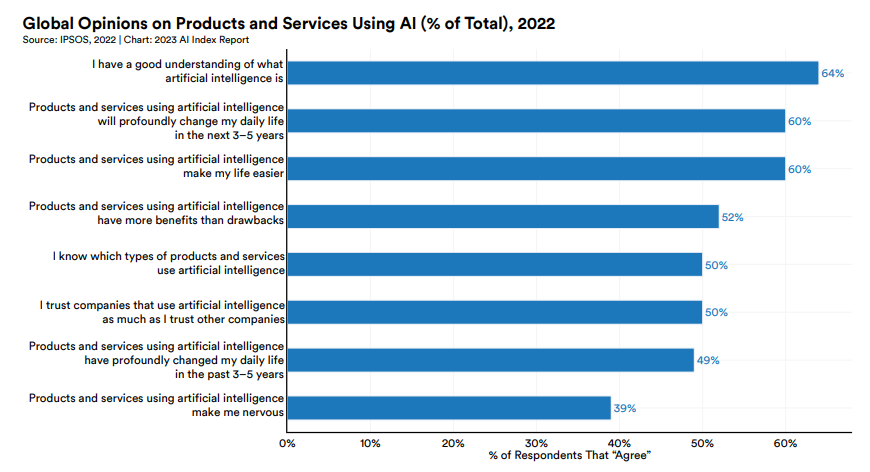What people think of AI: Stanford Index report | WARC | The Feed
The Feed
Read daily effectiveness insights and the latest marketing news, curated by WARC’s editors.
You didn’t return any results. Please clear your filters.

What people think of AI: Stanford Index report
A recent study by Stanford university in the US has gathered a series of available survey data from around the world on attitudes, hopes and fears around the burgeoning topic of AI using IPSOS and Pew data – here’s what you need to know.
Why it matters
There are two stories here: one is that, as you would expect, the people that anticipate benefits tend to be wealthy, male, and white (at least in the US), which raises deep questions about the design of AI systems, especially when it comes to the workings behind the outputs it makes or risk entrenching deep bias.
However, for a technology that is often discussed in terms of a broader geopolitical tussle between the US and China, Americans are much more doubtful and less trusting about AI than China, whose respondents are the most optimistic of any country in the world, with many Chinese respondents noticing the benefits to their lives right now.
What’s going on
At a global level, the study finds that a slender minority of people (64%) agree they have a good understanding of what AI is, and a similar proportion (60%) expect profound changes in the next 3-5 years, with a further (60%) agreeing that AI systems currently using AI make their lives easier.
But there remains a strong strain of doubt. 50% trust the companies currently developing the tech. While 52% agree the tech has more benefits, just 50% feel they know which products and services use the technology. AI products and services using AI make 39% of global respondents nervous.
Demographics
Broadly, those expressive positivity about the technology tend to be younger, wealthier, and slightly more male. In the US, Men tend to imagine their experience and views are quite well considered in the system design, a similar degree to white adults. Whereas 25% of women, and 33% of both black and Hispanic adults don’t believe that they are well represented in the systems.
It’s hard to escape the perception that employees and the unemployed are wary about what the technology might mean for their fortunes – though a slim majority of the employed are positive. Business owners and senior managers, meanwhile, are more bullish on the potential of the technology to improve their lives.
In a deep dive on Americans’ views based on Pew research data, the loss of human jobs is the top concern (19%), followed by the potential for digital surveillance (16%). Deeper concerns, however, such as misuses of AI or AI superintelligence running out of control are slim at 8% a piece. Worries about human bias bleeding into AI was cited by just 2% of the respondents.
On the arguments for the positive is the almost uselessly woolly hope that it will make ‘life, society better’ at 31%. Efficiency savings, the second-best reason for excitement comes in at just 13%. Depressingly, 10% just see this progress as inevitable.
Across countries
It’s fascinating to explore, according to IPSOS data, which countries are AI optimists, and which are pessimists. Agreeing with the statement ‘products and services using AI have more benefits than drawbacks’ by country:
- China 78%
- Saudi Arabia 76%
- India 71%
- Peru 70%
- Mexico and Malaysia 65%
While the most sceptical are:
- France 31%
- Canada 32%
- Netherlands 33%
- United States 35%
- Germany and Australia 37%
- Great Britain and Belgium 38%
Given that the AI debate is often framed around a competition between the US and China for supremacy in the technology, the disparity between the two countries’ respondents is striking.
Right now, while 87% of Chinese respondents agree that AI products and services make their lives easier, versus just 41% of US respondents. Meanwhile, the trust in the developing companies is way higher in China with 76% trust to the US’s 35%.
Sourced from Stanford AI Index Report 2023
Email this content
